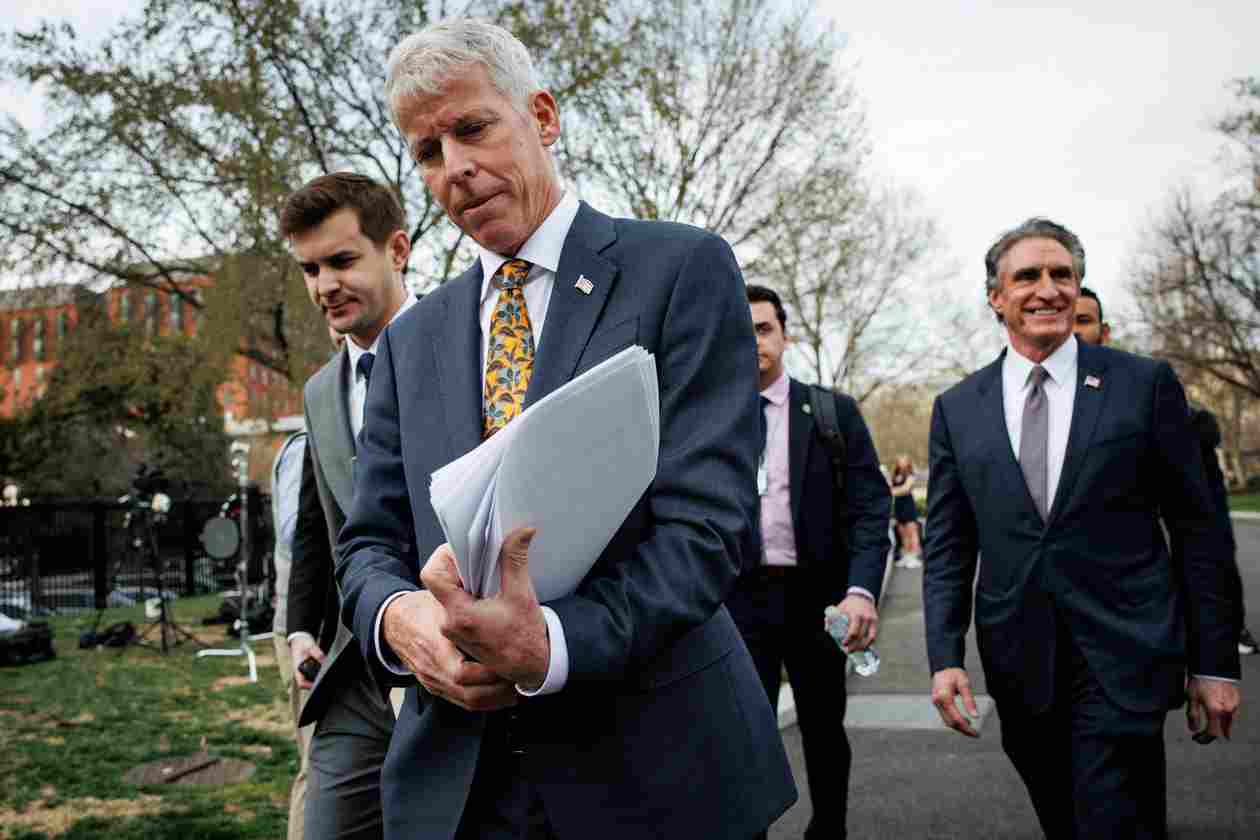
The president’s trade war annoyed investors and executives – and can undermine his promise to release “energy dominion.”
The US oil industry is suffering from lower gross oil prices in years, increased steel costs and an economic crisis that can cause consumer demand for its ability.
Oil prices have plummeted almost 15% since April 2, reaching the lowest level since April 2021, a fall that has been testing the patience of industry executives. And it is leading some in the industry to alert the White House that Trump’s trade policy is in danger of ruining its “energy domain” plan.
So far, however, the sector will maintain its support for President Donald Trump, hoping its appeals to negotiate commercial pacts with individual countries to avoid tariffs and the republican plan to extend tax cuts offset their financial problems.
The reluctance of the industry to criticize Trump is publicly remarkable, given the pain it is feeling with the import taxes that it has increased on the steel that oil companies need for new oils and projects, as well as the anger of foreign buyers of their energy that their trade war has generated.
“Trump’s tariff bet places energy dominance on a crossroads,” said an oil company executive who had made donations to Trump’s election campaign and had his name preserved to talk frankly about the matter. “Finding a delicate balance between commercial firmness and market stability will determine whether the US will maintain its advantage – or are in danger of undermining its own domain.”
Trump’s promise to achieve global “energy domain” was a central campaign promise – and the theme of the 1st executive order. But although he said his government would dramatically increase US oil production, the fears of a recession are leading the industry to rethink its investments in new wells.
An oil lobbyist said he met with government authorities and republican senators behind the scenes to defend his arguments in favor of exemptions on steel imports. But so far, Trump’s closest legislators, who may be more able to convince him, are also the least friendly to an exemption, said that person.
Alabama Republican Senator Tommy Tuberville, “basically told us to be quiet and accept,” said that person.
“Clearly, Trump cannot expect to achieve ‘energy domain’ and meet the growing demand for electricity and maintain these tariffs for a long time,” the person added.
Tuberville’s office did not respond to a request for comment.
So far, the sector has not followed the example of Wall Street investors, such as Bill Ackman, who warned that Trump’s fares would cause a recession. Instead, executives and lobbyists in the sector are closed, as their companies’ stock prices ranged strongly, ending last week well below where they were when Trump announced the tariffs.
Although Trump has suspended most of his country rates per country for 90 days, analysts warn that the damage is already done.
Trump’s 125% tax on China imports and a 10% tax on most other imports should force consumers to spend more on goods and less travel, warning analysts. Its 25% tax on imported steel will also increase the price of one of the main materials in the oil industry, limiting its plans to build new drilling equipment, pipelines and storage tanks.
Market analysts now predict that growth in oil production in the United States will slowly slow, and may even fall from record levels registered last year. If oil at $ 60 per barrel remains the standard until the fall, US drilling companies can produce only 200,000 barrels a day more than in 2024, reducing interest in buying their shares, said Simon Wong, portfolio manager of the investment company Gabelli Funds.
“I would remain cautious about the energy sector and wouldn’t invest new money on it,” said Wong.
The US Oil and Gas Dow Jones Index, which monitors 42 companies, has fallen more than 15% since Trump made the announcement of the White House Rose Garden fare on April 2, leading it to its lowest level since 2022 and three times the loss recorded in the same period by the Dow Jones Industrial Averag index.
The White House forwarded a commentary request to the Department of Energy. A Door spokesman refused to comment, citing, instead, comments that Energy Secretary Chris Wright has given Bloomberg Television, stating that he did not expect any change in global oil demand.
“We see a market now concerned about economic growth,” Wright said during the interview. “And I think we’re seeing a drop in oil prices because of that. But I think this fear is unfounded. I think we’ll end up in a much better economic situation than we entered this Trump term.”
Even with Trump’s trade war threatening to cut global oil demand for oil, Opep’s oil producing states and their partner Russia are increasing their own gross oil production, Bhushan Bahree, executive director of the S&P global commodity analysis company, said in an interview.
Falling prices and increased global production are placing US oil producers in a particularly difficult situation, he added. American oil prices were around $ 60 a barrel for much last week, falling close to $ 55, a price range that can lead oil not only to interrupt the drilling of new wells but also to restrict the flow of existing wells.
This retraction is already beginning: drilling in the US shale fields fell at the fastest pace in almost two years last week in Baker Hughes’s probes count, Bloomberg News said on Friday.
US oil prices for $ 60 for a year would reduce national oil production by 500,000 barrels per day if companies did not increase the money rate they spend to maintain gross oil flow, Bahree said.
“Demand growth forecasts are being reviewed down every day” because of tariffs, Bahree said in an interview.
On Thursday, US Energy Information Management (EIA) reduced its forecast for oil growth growth by 400,000 barrels per day. Investment Bank Macquaire announced last week that it would probably reduce its previous prediction of oil production growth in the US to 350,000 barrels per day – a drop in 200,000 barrels compared to the previous forecast.
But the executives and lobbyists of the oil industry remain silent, at least publicly, fearing to openly criticize the government would be to put their heads in the mouth of a lion.
Lockers who had anonymity guaranteed to talk about their strategy to deal with Trump’s intermittent decisions said no one was willing to risk attracting government wrath if Trump began to announce trade agreements that could relieve economic tensions. In one case, Trump pressured the European Union to buy $ 350 billion in US energy exports to prevent him from imposing tariffs.
Some in the sector are waiting to see whether Congress Republicans will succeed in promulgating the extent of corporate tax cutting that they plan to include in their budget reconciliation legislation before considering criticism open to Trump’s business measures.
“If Congress is unable to approve a reconciliation bill, it can become the catalyst,” said a second lobbyist. “If we end what they seem to be permanent rates without any corresponding fiscal relief, the situation will become very delicate.”
Amos Hochstein, White House’s energy advisor to the Biden government and a former executive of a natural gas company, noted the irony of a democratic government provided incentives to oil industry in its historic inflation law, while a republican government has increased sector taxes and is trying to end incentives.
The oil industry was confused about the Trump government’s final strategy for energy policy, Hochstein said.
“There is a perplexity of what we are trying to achieve,” said Hochstein. “I feel there has been a lot of talk about trying to solve the problem of energy production, but no one knows what problem we are trying to solve.”
Originally published by the politician on 14/04/2025
Por Ben Lefebvre
Source: https://www.ocafezinho.com/2025/04/15/a-turbulencia-economica-de-trump-testa-a-paciencia-da-industria-petrolifera/

